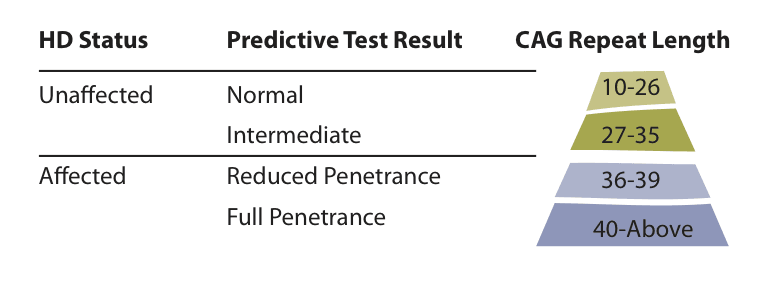Testing for Huntington's Disease
Everyone is born with the huntingtin gene; however, some people have an abnormal copy of the gene that causes the huntingtin gene to expand and cause the symptoms of the disease. Someone can only have an abnormal copy of the gene if one of their parents has an abnormal copy. If a parent has the abnormal gene, each of their children has a 50% chance of having the abnormal gene. Every person who carries the abnormal gene will eventually develop symptoms if they live long enough.
In 1983 scientists discovered a gene marker linked to HD. In 1993 they isolated the gene on chromosome 4 and identified that people with HD have a mutant expanded form of the gene. A blood test was developed to identify if a person has abnormal gene. This test is highly accurate, but it can’t determine when the symptoms of the disease will start or the severity of the symptoms. People can test positive for the abnormal HD gene and not have any symptoms for many years.
If you use a blood test to figure out if you have the abnormal gene, it’s called predictive testing. Typically, only adults over the age of 18 are tested for HD. The rare exception is when medical professionals believe a youth has the symptoms of Juvenile Onset HD. If someone waits until they or someone they know believes they have symptoms of HD, they will see a doctor to confirm the diagnosis.
CAG Repeats
When blood samples are analyzed for Huntington’s disease, they are looking to see how many times the “letters” CAG repeat on the huntingtin gene. Here is breakdown of what they are looking for in the lab:
Less than 27 CAG repeats – Negative, will not develop HD and children are not at risk
27-35 CAG repeats – will not develop HD, but their children have a small risk
36-39 CAG repeats – Positive, may develop symptoms at an older age. Their children have a 50% chance of having HD.
40+ CAG repeats – Positive, person will develop symptoms. Their children have a 50% chance of having HD.


